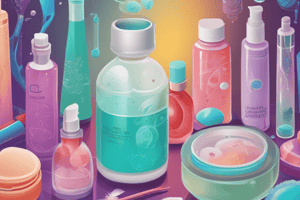Podcast
Questions and Answers
What is one of the primary benefits of silicones in skin care products?
What is one of the primary benefits of silicones in skin care products?
- Promoting natural healing
- Increasing skin temperature
- Enhancing the skin's natural oils
- Locking in moisture (correct)
In which type of cosmetic product is Dimethicone most commonly found?
In which type of cosmetic product is Dimethicone most commonly found?
- Foundations
- Shampoos
- Moisturizers (correct)
- Sunscreens
How do silicones contribute to the texture of skin care products?
How do silicones contribute to the texture of skin care products?
- By filling in gaps between skin cells (correct)
- By making them oily and heavy
- By causing skin tightness
- By providing a gritty feel
Which silicone is known for providing a lightweight, non-greasy feel in hair care products?
Which silicone is known for providing a lightweight, non-greasy feel in hair care products?
What role do silicones play in anti-aging products?
What role do silicones play in anti-aging products?
What is a major concern regarding the environmental impact of silicones?
What is a major concern regarding the environmental impact of silicones?
Which silicone is primarily used to improve the spreadability and blendability in makeup products?
Which silicone is primarily used to improve the spreadability and blendability in makeup products?
Which of the following is a commonly explored alternative to silicones in cosmetics?
Which of the following is a commonly explored alternative to silicones in cosmetics?
Study Notes
Silicones in Cosmetics
What are Silicones?
- A type of synthetic polymer derived from silicon and oxygen atoms
- Characterized by their unique properties: flexibility, water repellency, and heat resistance
Benefits in Cosmetics
- Moisturizing properties: Silicones help lock in moisture, leaving skin feeling soft and supple
- Emollience: Fill in gaps between skin cells, giving skin a smooth and even texture
- Protection: Provide a barrier against environmental stressors, such as wind, cold, and dry air
- Anti-aging: Help reduce appearance of fine lines and wrinkles by filling in skin crevices
Common Cosmetic Applications
- Skin care products: Moisturizers, face creams, lotions, and serums
- Hair care products: Shampoos, conditioners, hair masks, and styling products
- Makeup products: Foundations, primers, eyeshadows, and mascaras
- Sun care products: Sunscreens, sunblocks, and after-sun lotions
Specific Silicones Used in Cosmetics
- Dimethicone: A popular silicone used in skin care products due to its moisturizing and protective properties
- Cyclomethicone: Used in hair care products to provide a lightweight, non-greasy feel
- Phenyl Trimethicone: Used in skin care products to provide moisturizing and emollience benefits
- Trimethicone: Used in makeup products to improve spreadability and blendability
Controversies and Debates
- Safety concerns: Some silicones have been linked to skin irritation, respiratory issues, and environmental harm
- Environmental impact: The production and disposal of silicones can contribute to environmental pollution
- Alternative ingredients: Some cosmetic companies are exploring natural alternatives to silicones, such as plant-derived emollients.
Overview of Silicones in Cosmetics
- Silicones are synthetic polymers made from silicon and oxygen.
- Noted for flexibility, water repellency, and heat resistance, making them valuable in cosmetic formulations.
Benefits of Silicones
- Moisturizing properties enable retention of moisture, enhancing skin softness.
- Emollient function smooths skin texture by filling spaces between cells.
- Protective barrier against environmental stressors like cold weather and wind.
- Anti-aging effects help diminish the visibility of fine lines and wrinkles.
Common Uses in Cosmetic Products
- Skin care: Incorporated in moisturizers, creams, lotions, and serums for skin hydration.
- Hair care: Found in shampoos, conditioners, and styling products to improve manageability.
- Makeup: Utilized in foundations, primers, and eyeshadows to enhance application and finish.
- Sun care: Essential in sunscreens and after-sun products for skin protection.
Types of Silicones in Cosmetics
- Dimethicone: Frequently used in skin care for its moisturizing and protective qualities.
- Cyclomethicone: Known for its lightweight, non-greasy texture in hair care items.
- Phenyl Trimethicone: Offers moisture and emollient benefits in skin care formulations.
- Trimethicone: Enhances spreadability and blendability in makeup products.
Controversies Surrounding Silicones
- Safety issues: Some silicones linked to skin irritations and potential respiratory problems.
- Environmental concerns: Production and disposal practices may lead to pollution.
- Pursuit of alternatives: Cosmetic companies are investigating natural emollients as silicone substitutes.
Studying That Suits You
Use AI to generate personalized quizzes and flashcards to suit your learning preferences.
Description
Learn about silicones, synthetic polymers used in cosmetics, and their benefits for skin care, including moisturizing, emollience, and protection.




